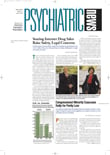People with depression and comorbid pain use more general medical services than those who are depressed without pain—but they use mental health specialty services less.
Depressed persons with comorbid pain tend to be older, have lower incomes, and report more severe psychiatric distress than depressed persons without pain, according to a report in the May issue of the APA journal Psychiatric Services.
Yet surprisingly, they were about 20 percent less likely to see a mental health specialist than patients without pain, say study authors Yuhua Bao, M.A., and colleagues.
“Depressed persons with chronic pain are in greater need of mental health care, yet pain and other social economic factors such as lower income have limited their access to specialty care,” Bao told Psychiatric News.
“General medical practitioners will want to carefully determine the nature and degree of this distress and make referrals for specialty care when appropriate. Policies that may reduce potential barriers to mental health care for this vulnerable population should be carefully considered.”
Bao is a research associate at the RAND Corporation in Santa Monica, Calif.
Bao said that the tendency of depressed patients with chronic pain not to seek specialty mental health care may not be as surprising as it appears on the surface.
“Some individuals may assign pain symptoms higher levels of medical priority, especially given the stigma associated with mental health specialty care,” she and colleagues wrote in their report. “In the presence of pain, there are more perceived reasons not to seek help from mental health specialists, especially if individuals interpret emotional symptoms as the consequence of physical illness. Furthermore, the fact that health insurance benefits for specialty mental health care are more restrictive than benefits for other types of care may serve as an additional incentive to use primary care. Finally, it may be appropriate for some depressed individuals to substitute general or subspecialty medical care for mental health specialty care in circumstances when the severity of the physical pain requires very high levels of overall medical care.”
Demographic Profile
In the study, researchers examined data from the Health Care for Communities study, a national household survey conducted in 1998 with 9,585 respondents. The survey asked generally about mental health and other chronic health conditions, as well as specifically about three conditions commonly associated with body pain: arthritis or rheumatism, chronic back problems, and chronic severe headache. A total of 1,486 adults met the criteria for major depression or dysthymia; of these, 938 also reported having at least one form of chronic pain.
(The study authors noted that the Health Care for Communities survey included some adults who had participated in an earlier survey—the Community Tracking Study—and thus was able to oversample persons likely to have mental health problems; consequently, the proportion of persons with mental health disorders was about 50 percent higher than in a similarly sized random population sample, they said.)
The depressed patients with pain were an average of 10 years older than those without pain, had less education, and had a much lower average annual family income.
Bao told Psychiatric News that the demographic profile is consistent with conventional wisdom. “All else being equal, older people are more likely to have pain and other chronic conditions,” she said. “That depressed persons with chronic pain have lower incomes is consistent with the fact that income is positively correlated with health, which is observed across different populations.”
The patients with comorbid pain and depression also experienced greater psychiatric distress. “Depression may be exacerbated because of comorbid pains,” Bao said. “At the same time, comorbid pain itself may be a manifestation of psychiatric distress.”
Analysis of the data showed that pain was significantly associated with three service use outcomes among those with depression: a lower likelihood of having any mental health specialty visits, a greater likelihood of visiting a medical professional, and a greater likelihood of using complementary and alternative medicine.
The latter includes homeopathic medicine, acupuncture, massage therapy, herbal medicine, and spiritual healing. “Depressed persons with pain are more likely to use alternative medicine than those without pain because therapies such as acupuncture and massage are especially effective for alleviating bodily pain,” Bao said.
Depression Attributed to Pain
Psychiatrist Carol Alter, M.D., said the study confirms—once again—the high utilization of health care services by depressed patients. And it confirms as well the prevalence of chronic pain concomitant with depression.
“Of the 1,486 patients who had depression, the vast majority had some sort of painful condition,” Alter told Psychiatric News. “From a psychiatric perspective, we need to be aware of that. But if you were to interview 100 psychiatrists, most would not guess that 60 or 70 percent of depressed patients have chronic pain.”
Alter is president of Frontier Medical Consultants in Princeton, N.J., and a member of APA’s Committee on Consultation-Liaison Psychiatry and Primary Care Education. She formerly directed a cancer pain program at Temple University.
Alter said her own work with patients in pain conforms to the hypothesis put forward by Bao and colleagues regarding why patients may not seek mental health care. “As the study authors suggested, pain patients will identify pain as the primary problem and attribute the depressive symptoms to the pain,” she said.
In fact, she said, the clinical reality is likely to be just the opposite: treat the depression, and the patient’s pain may diminish markedly.
“The complexity of the relationship between pain and depression is something that is important for us to examine,” Alter said. “Comorbidity implies that together two syndromes or symptoms have more morbidity than if they are separately added together. With depression there are liable to be vague somatic complaints associated with the condition by definition. Certainly they may exist prior to the depression, but they can get worse with the depression.
“Pain is an experience of a neurologic phenomenon—so it’s not that far removed from depression, which is also the experience of a neurologic condition,” she pointed out.
Psychiatric Services 2003 54 693
